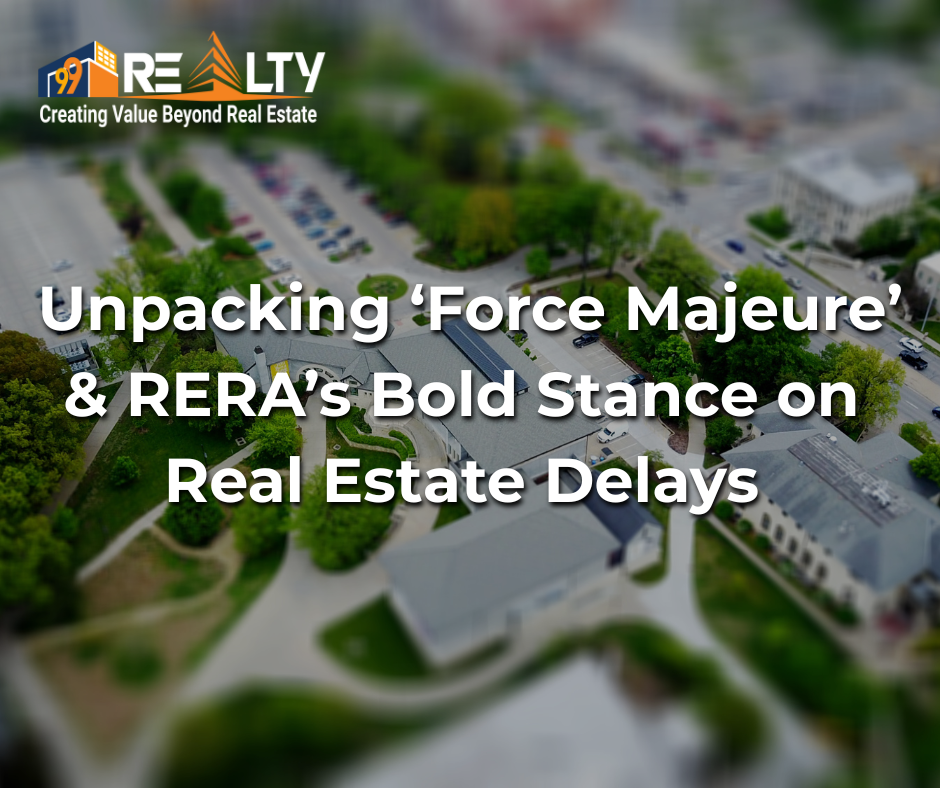Have you felt the frustration of paying EMIs on time, only to face endless delays on your dream home? Many homebuyers are in that boat—waiting and waiting with no delivery date. Builders sometimes drop the “force majeure” card to dodge deadlines. But is that legally valid? Let’s dive into what RERA has to say about it.
Benefits of the RERA Act for Homebuyers
What Is “Force Majeure”?
Imagine you’re planning a big outdoor wedding. You’ve booked the venue, the band, and everything’s perfect. But suddenly, on the wedding day, a massive cyclone hits the city, and everything is shut down. No one could have predicted it, and it’s completely out of your control. In that case, you can’t be blamed for not holding the event. That’s basically what force majeure means.
In legal and contract terms, “force majeure” (a French term meaning “superior force”) is a clause that protects people or companies from being punished if something big and unexpected happens—something that makes it impossible to do what they promised.
A force majeure clause says:
“If something major and unexpected happens—like a natural disaster, war, or pandemic—that stops me from doing what I promised in this contract, I won’t be held responsible for the delay or failure.”
Let’s say a builder promised to hand over your flat by December 2025. But in August, a sudden flood damages the entire construction site, and the government shuts down all construction in the area for safety checks.
This is force majeure—the delay happened due to a natural disaster that the builders couldn’t control.
RERA & Force Majeure: Legal Framework
When it comes to possession delays in real estate, RERA (Real Estate Regulatory Authority) is the watchdog ensuring fairness between builders and homebuyers. One of the key grey areas often misused is the “force majeure” clause—and that’s exactly where RERA’s legal framework steps in.
Let’s decode it.
Possession Certificate in India: The Ultimate Guide to Secure Home Ownership
Section 6 – Extension of Project Registration
Under Section 6 of the RERA Act, builders can request an extension of their project’s registration if they’re unable to complete the work due to genuine force majeure conditions.
But what counts as “genuine”? According to the law:
- Natural calamities like floods, earthquakes, or cyclones
- Government-imposed restrictions, such as lockdowns, riots
- War, epidemic, or any event beyond human control
These are considered valid reasons only if they directly disrupt construction timelines.
Example:
During the COVID-19 lockdown, several state governments including Maharashtra, Tamil Nadu, and Karnataka issued automatic extensions of 3 to 6 months for ongoing real estate projects. These were blanket extensions recognizing that movement restrictions and halted supply chains genuinely delayed construction activities.
But here’s the catch: builders can’t use force majeure as a blanket excuse for any and every delay. The burden of proof lies with the builder—they must show:
- The exact nature of the force majeure event
- How it impacted the project timeline
- That no alternative remedy was feasible
In short, if the delay happened due to internal mismanagement or poor planning, RERA won’t buy the excuse.
Model Agreement vs. Customized Clauses
The RERA Act includes a Model Agreement for Sale—a standardized contract that’s designed to protect homebuyers. It does include a clause that allows time extensions when:
“The delay arises due to notice, order, or directive from any government or statutory authority.”
This clause is fair and logical—it protects builders from being penalized when external forces (like government construction bans or pandemic curfews) are at play.
But here’s where things get tricky.
Many developers tweak the contract by inserting auto-extension clauses—provisions that automatically extend project deadlines in the event of vague or loosely defined situations. Some of these include:
- Delays in approvals
- Material shortages
- Unavailability of labor
- Pandemic-like situations, even after they’re over
These customized clauses are often:
- One-sided, favoring the developer
- Loosely worded, open to misinterpretation
- Not aligned with the spirit of the RERA Act
RERA’s Stand:
State RERA authorities across India have increasingly called out and dismissed such blanket clauses. They maintain that:
- Extensions must be justified on a case-by-case basis
- Buyers must be informed transparently
- Contracts can’t include non-negotiable, builder-biased terms that override state rules
RERA provides a balanced legal framework that acknowledges genuine delays but does not tolerate misuse of legal grey zones.
So, while force majeure is a real and legally valid concept, it’s not a get-out-of-jail-free card for builders.
Case Study I: Builders Misusing Force Majeure
Buyer’s Long Wait: 10‑Year Delay
One heartbreaking case: a buyer paid ₹1.07 crore in 2013–14, but waited 10 years without gaining possession. The builder kept shifting projects, using COVID-19 lockdowns as an excuse—even though agreements were signed post-lockdown.
RERA’s Verdict: No COVID‑19 Excuse
Haryana RERA ruled the builder couldn’t invoke force majeure. They caught that the pandemic began in 2020, but the sales pact was in 2021—so the excuse didn’t hold RERA ordered a refund of ₹1.07 crore plus 11.1% interest—totaling about ₹2.26 crore.
Case Study II: ₹65 Lakh Compensation for 9‑Year Delay
Another recent ruling: a Delhi-NCR buyer faced a 9-year delay. The developer blamed COVID-19, chairman’s death, water issues—but RERA dismissed these reasons. The buyer was provided ₹65 lakh in compensation. This proves RERA’s growing intolerance for frivolous force majeure claims.
Key Legal Takeaways for Buyers & Builders
Buyers’ Rights Under RERA:
- You’re entitled to timely possession—failure to deliver equals deficiency of services.
- RERA can mandate refunds plus interest at SBI MCLR + 2%, under Section 18.
- Force majeure offers no escape when delays are due to inefficiency or planning flaws.
Builders’ Limitations:
- Only true, unforeseeable events count—not prior delays or mismanagement.
- Extensions must be transparent, reasonable, and backed by solid evidence.
- Auto-extension clauses are frowned upon unless fully disclosed and fair.
Tips for Homebuyers Facing Delays
1. Scan the Agreement
Look for force majeure or auto-extension clauses. If these lean heavily toward the builder, that’s a red flag.
2. Keep Records
Track payment dates, email exchanges, and promises. These build your case.
3. File Complaints Through RERA
With delays over 24 months, approach RERA with documentation. They’ll review and can order refunds/compensation or midway solution.
4. Seek Legal Counsel
Consult a real estate expert who knows contract law and RERA provisions inside out.
Conclusion: Fair Play Wins
Force majeure is meant to provide relief in true emergencies—not to cover up project delays by builders. RERA’s recent pronouncements make it clear: excuses like COVID-19 won’t cut it anymore when documentation and timing don’t match. Homebuyers must stay vigilant, know their rights, and hold builders accountable. Developers, on the other hand, must deliver on promises—or be ready to refund with interest. In real estate, transparency and fairness are non-negotiable.
FAQs
1. What exactly qualifies as force majeure in a real-estate agreement?
Generally, unforeseeable events beyond control—natural disasters, government orders, pandemics (if explicitly included).
2. Can builders auto-extend deadlines using clauses in sale agreements?
Yes, but only if deemed fair and reasonable by RERA. Overreaching auto-extension clauses often get struck down.
3. How much compensation can I get if possession is delayed?
Under Section 18, RERA can order refund of payment plus interest at SBI MCLR + 2%.
4. Can COVID‑19 be used as a force‑majeure excuse?
Only if the agreement was signed before the pandemic and properly mentions epidemics. Otherwise, unlikely.
5. How long before I can file a RERA complaint for delay?
Typically, if possession isn’t handed over within 24 months of the agreed date, you can approach RERA.
Disclaimer: The information provided in this article is for general informational purposes only and does not constitute legal, financial, or professional advice. While 99Realty strives to ensure the accuracy of the content, we advise to consult qualified legal or real estate professionals before making any property-related decisions. 99Realty is not liable for any losses, damages, or consequences arising from reliance on the content of this article.
Need Help?
Need help evaluating a property or planning your next move in the market?
Reach out to 99 REALTY – your trusted real estate partner for smarter choices.
Subscribe to get updates on our latest posts and market trends.






Join The Discussion